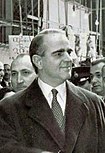
Konstantinos G. Karamanlis, commonly anglicised to Constantine Karamanlis or just Caramanlis, was a four-time Prime Minister and twice President of the Third Hellenic Republic, and a towering figure of Greek politics whose political career spanned much of the latter half of the 20th century.

The Democratic Social Movement is a Greek democratic socialist political party. The party was founded in 1995 by Dimitris Tsovolas and several ex-members of the Panhellenic Socialist Movement (PASOK), the then ruling social-democratic party.

The Free Democratic Party or Radical Democratic Party was a liberal political party in Switzerland. Formerly one of the major parties in Switzerland, on 1 January 2009 it merged with the Liberal Party of Switzerland to form FDP.The Liberals.

The Panhellenic Socialist Movement, known mostly by its acronym PASOK is a social-democratic political party in Greece.

The New Democracy, also referred to as ND (ΝΔ) by its initials, is a liberal-conservative political party in Greece. In modern Greek politics, New Democracy has been the main centre-right political party and one of the two major parties along with its historic rival, the Panhellenic Socialist Movement (PASOK). Having spent two and a half years in government under the presidency of Antonis Samaras, New Democracy lost its majority in the Hellenic Parliament and became the major opposition party after the January 2015 legislative election.
Venizelism was one of the major political movements in Greece from the 1900s until the mid-1970s.

Parliamentary elections were held in Greece on 20 November 1977. After Prime Minister Constantine Karamanlis called for early elections, his New Democracy party suffered a significant loss of power. However, Karamanlis managed to secure an absolute majority in the Parliament. The big surprise was the success of PASOK, whose socialistic rhetoric remained radical. Because of PASOK's success, the Centrists led again by Georgios Mavros lost half of their power. As a result, Andreas Papandreou, PASOK's leader, became a prominent figure in Greek politics. The Communists and the Nationalists managed to amplify their support.

National Alignment was a nationalist-conservative Greek political party that contested only the 1977 legislative election, winning 7% of the vote and five seats. It was founded by conservatives who split from Konstantinos Karamanlis and his New Democracy party, who resented Karamanlis moving towards the center and distancing himself from hard-right elements, and alleged that Karamanlis had given too many concessions to the left, in particular by legalizing the Communist Party of Greece and overseeing the imprisonment of the leaders of the 1967–1974 junta. The EP's leader was Stefanos Stefanopoulos, and its deputy leader was Spyros Theotokis. Although the party was not officially royalist, Theotokis was a noted royalist, giving the party somewhat of an association with the monarchist right.
The People's Party was a conservative and pro-monarchist Greek political party founded by Dimitrios Gounaris, the main political rival of Eleftherios Venizelos and his Liberal Party. The party existed from 1920 until 1958.

Parliamentary elections were held in Greece on 19 February 1956. The result was a victory for Constantine Karamanlis and his National Radical Union party by securing the electoral vote despite trailing in the popular vote. It was the first general election in Greece in which women had the right to vote, although women had first voted in a by-election in Thessaloniki Prefecture in 1953 in which the first female MP was elected.

Parliamentary elections were held in Greece on 11 May 1958. The result was a second consecutive victory for Constantine Karamanlis and his National Radical Union party, which won 171 of the 300 seats in Parliament.

Parliamentary elections were held in Greece on 3 November 1963. They resulted in a narrow victory for the Center Union of Georgios Papandreou after three consecutive victories of Konstantinos Karamanlis and his National Radical Union party and after 11 years, during which the conservative parties ruled Greece.

Omonoia is a Greek social, political and cultural organization in Albania that promotes minority rights for the Greek minority in the south of the country.

Democratic Left is a social-democratic political party in Greece. DIMAR was a minority party supporting the Samaras cabinet from 21 June 2012 to 21 June 2013.

Parliamentary elections were held in Cameroon on 24 April 1964. They were the first elections held after Southern Cameroons became part of the country in 1961. The result was a victory for the Cameroonian Union in East Cameroon and the Kamerun National Democratic Party in West Cameroon. However, the election was marred by severe irregularities.
Progressive Party is a former Greek conservative political party founded in 1954 by Spyros Markezinis. The party was formed after Spyros Markezinis broke away from the Greek Rally.
In politics, centrism—the centre or the center —is a political outlook or specific position that involves acceptance or support of a balance of a degree of social equality and a degree of social hierarchy, while opposing political changes which would result in a significant shift of society strongly to either the left or the right.

















